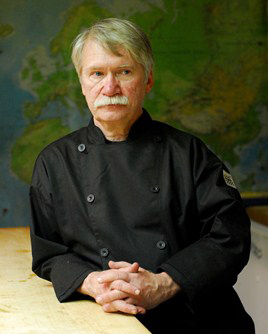Think Tank: Is Experience the Best Form of Education?
10 December 2014
 Employers seek graduates who follow directives, have a strong foundation of technical skills and enthusiastically respond, “Yes, Chef.” Yet knowing the “why” and “how to” is as important a skill as the actual process of completing a task.
Employers seek graduates who follow directives, have a strong foundation of technical skills and enthusiastically respond, “Yes, Chef.” Yet knowing the “why” and “how to” is as important a skill as the actual process of completing a task.
By Paul Sorgule, MS, AAC
The intent of articles in “Think Tank” is to stimulate opinion, emotion and, most importantly, openness to creative thought. Articles over the next few months will hopefully do just that.
I encourage you to share these with your faculty and administrative staff. Solicit their thoughts and create a dialogue in preparation for the next few decades of culinary education.
The question of theory vs. practical application has been a topic of debate for quite some time. The core issue is whether or not the traditional model of education really prepares a student to be a productive and successful member of society or if the “school of hard knocks” still reigns supreme.
“The education of circumstances is superior to that of tuition.”—William Wordsworth
“Knowledge gained through experience is far superior and many times more useful than bookish knowledge.”—Mahatma Gandhi
Now, these were two brilliant individuals who, through their passion and work, defined the true intellect of generations. On the surface, it would appear that their preference was to steer away from the structure of education and simply immerse in life experience. There is little doubt that following in the footsteps of others is a time-tested manner of building a skill set. As teachers, it would be difficult to deny the value of hands-on as a way to teach and learn.
“Tell me, I’ll forget. Show me, I’ll remember. Involve me, I’ll understand.”—ancient Chinese proverb
Chef-instructors know from experience that cooking skills are built through hands-on repetition. The more that a student performs a certain task, the greater his or her confidence, and the more successful he or she will become.
Is this true with all of the skills and aptitudes that are required of future chefs and managers? Where does theory come into play, and how valuable is this as a component of knowledge?
What experience might not teach a student of the kitchen is the “why” of a task and the “how to” associated with problem solving. Experience tends to focus on training an individual to accomplish a task in a certain way, and in many respects, to not question directions given. The “why” and “how to” of problem solving will likely become as important a skill as the actual process of completing a task.
A basic example might be the use of a recipe in cooking. Recipes are critical tools in communicating a process, laying the groundwork for consistency, providing the basis for cost control and building systems for ordering and inventory control.
What a recipe fails to accomplish is prepare a cook to deal with variables. The maturity of the produce used might be different, the marbling of fat in the meat might vary, fresh herbs might need to be replaced with dried, an ingredient or two might not be in stock, and yet, the product still needs to be made.
An understanding of the end product and alternative ways to get to the same outcome is knowledge that separates an excellent cook from a novice. The “why” and “how to” suddenly trump the training used to show a cook how to follow the recipe. An educated person is one who hungers to know more about anything and everything and learn how to be the answer to any inevitable question.
“Education is not the filling of a pail, but the lighting of a fire.”—William Butler Yeats
On the other hand, a few chapters in a text and even the use of case studies in a class will never prepare a graduate to interface with an employee who has a number of issues or a guest who is ready to bite a server’s head off because the product did not meet his or her expectations. Only experience can prepare the individual for success in these situations.
Those of us who found ourselves in the field of education through the experiences of a chef or restaurateur understand that operators are primarily interested in students who follow directives, have a strong foundation of technical skills and enthusiastically respond, “Yes, Chef.” This is a fact, and one that cannot be overlooked as we build curriculum and design how our classes will be delivered.
We should not, and cannot, build a successful program and graduate successful students unless this reality is woven through everything that we do. On the other hand, the future of any restaurant and even that of our industry is determined by those who question, challenge, invent, reinvent and mold the restaurant experience that will be, rather than simply is.
The answer to the question of education vs. experience is simple: They are both critical. Knowledge is a combination of the two, and our responsibility as educators is to seek ways to address both through creative course content and delivery, partnerships with industry leaders, internships and externships and ongoing dialogue with all stakeholders in the knowledge business.
What do you think?
Paul Sorgule, MS, AAC, president of Harvest America Ventures, a “mobile restaurant incubator” based in Saranac Lake, N.Y., is the former vice president of New England Culinary Institute and a former dean at Paul Smith’s College. Contact him at This email address is being protected from spambots. You need JavaScript enabled to view it., www.harvestamericaventures.com.
